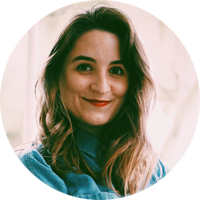
Jessie Fontana-Maisel, (Rome | Spring 2014), is taking her love for Italian history to new heights. Jessie is completing her Master’s degree in Art History, specifying in Italian Renaissance, at Courtauld Institute of Art in London. She is also applying her knowledge outside the classroom, working at Courtauld Gallery museum.
IES Abroad: Tell us what you’re up to in London.
Jessie Fontana-Maisel (JFM): I am in London completing my Master’s degree in Art History, specifying in the Italian Renaissance at the Courtauld Institute of Art. I am also working for the Courtauld Institute and for the Courtauld Gallery (the museum associated with my school).
IES Abroad: When did you decide you wanted to go back and why?
JFM: This past summer. I was able to visit Courtauld’s campus and saw the incredible resources available here in London. It made a lot of sense to go abroad for my Masters for several reasons. One, because of the international learning experience I would get in London. Two, because the programs here are usually less than one year (most MA programs in the United States are two years), and, in turn, the cost of education is much more reasonable.
IES Abroad: Did studying abroad with IES Abroad influence your decision? Anyone or anything that influenced you in particular?
JFM: Studying abroad (and particularly interning abroad) taught me how to adapt to a new cultural atmosphere. Despite the challenges that came with this, I found myself learning so much more by gaining a more global perspective. IES Abroad was central in my decision to go abroad again because of the internship program that I participated in during the semester while living in Rome.
Working abroad was a much more culturally immersive experience than merely studying abroad, and this challenge pushed me and made me want to go abroad again. I was influenced most by my internship placement (at a contemporary art gallery), the Center Director of IES Abroad Rome (Dott. Gianni Ponti), and my passionate professors in Rome.
IES Abroad: What’s it like living in London having not originally studied abroad there?
JFM: Because I had visited London extensively before moving here, the shift was not incredibly difficult. So far I have loved living here - the city is extremely vast and holds so many resources for students. It also doesn’t hurt that English is the primary language.
IES Abroad: How did you make it happen? Tell us about the process.
JFM: I did it a nontraditional way. I applied rather last minute and nearly five months past the deadline. I visited the Courtauld in May when I was in London, and immediately fell in love. I knew that I wanted to apply to a Master’s program eventually, but thought I would give myself a year or two off to work after graduation.
Visiting the Courtauld’s campus was really motivating and I was convinced to apply for the Fall 2016 term. Luckily, my special option in the Italian Renaissance still had an open position, so I wrote my essays and application, and gathered my letters of recommendation in about a week. I applied in June and had a Skype interview at the beginning of July. I was offered a position at the end of my interview and accepted right away. I moved to London in the beginning of September. It was a quick decision and turn-around in terms of moving across the world, but I don’t regret any of it.
IES Abroad: What advice would you give to study abroad students who want to work or study abroad?
JFM: It’s important to not get too caught up in your routine. One day I had to take an alternate (and confusing) route to my internship. I felt super lost and anxious until I turned a corner and found myself in front of the Pantheon – one of the most beautiful and important architectural monuments in the world. It was a huge wake-up call to never stop exploring and appreciating the things around me, even when my schedule got hectic.
IES Abroad: Best piece of career advice you’ve ever received?
JFM: Make personal connections, talk to people, and follow up on emails.
IES Abroad: Why do you think it’s important to try to live, work, and/or study abroad?
JFM: It’s unlike anything else you will ever do. Living/working abroad allows for a much more diverse and global learning experience that you don’t get in the United States. You have the opportunity to travel and speak new languages and overcome cultural barriers that you may not have ever anticipated. It’s a way to push yourself, but is also a way to promote global interactions and discourse.
For more information on our IES Abroad Alumni, visit our Alumni page.

